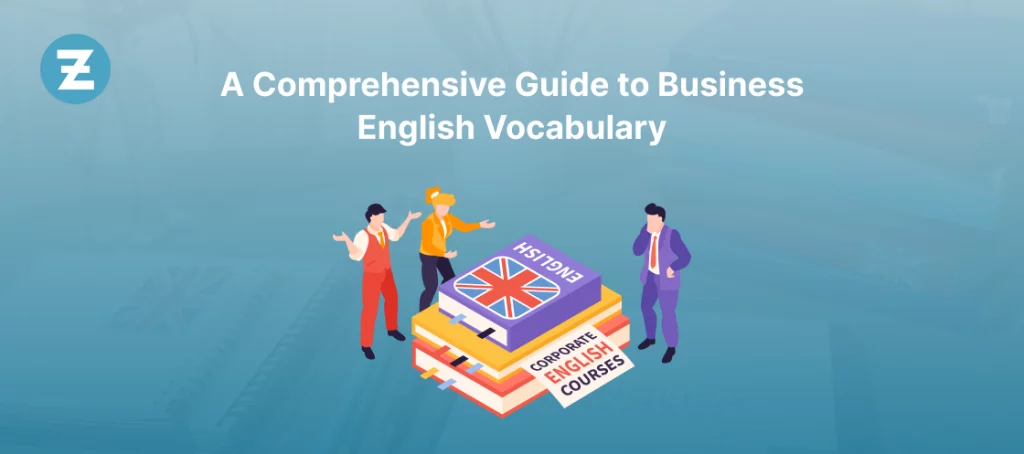One of the most important things in global business is effective communication.In the modern world, where English is considered the primary language used in global business, it has become imperative for one to develop proficiency in English, especially for professionals who want to succeed in their careers. However, mere acquaintance with the language will not do; transmitting ideas, establishing connections, and leaving deep footprints necessitate a rich variety of business words. The comprehensive guide will explore why business vocabulary matters and go over various areas of communication that can be improved by enriching vocabulary concerning different phrases and expressions.
Why Business Vocabulary Is Important
You will appear professional and articulate more ideas briefly. This suggests that one needs to establish trust and strong bonds with colleagues and customers at work. Consequently, you have a higher chance to manoeuvre through the complex world of business by expanding your vocabulary in business terms.
Read also: How Can You Enhance Your English Vocabulary with Simple Steps?
Vocabulary for Business Communication
A. Professional Greetings and Introductions
1. Formal business greetings
In the business world, greetings are very important because they help build a good relationship between the parties involved. “Good morning,” “Good afternoon,” and “Nice to meet you” are some of the formal greetings that can set the appropriate tone. Cultural norms as well as context must be considered when selecting an appropriate greeting.
2. Various Introduction Techniques
Introducing oneself in a professional manner needs to be both tactful and precise. It is important to be able to introduce yourself and others confidently, as this will help with networking and relationship building. This can be done by giving a short background, mentioning key accomplishments, or showing excitement, among other methods.
3. Polite Ways of Addressing Colleagues and Clients
It is important to be respectful to employees and customers in order to maintain a good working relationship. Get to know how to use correct titles like Mr., Ms., or Dr. Also, familiarise yourself with cultural customs for addressing people by their first names or surnames.
B. Business Meetings and Presentations
1. Vocabulary for Efficient Meeting Participation
A well-rounded knowledge of the language used in meetings is necessary to actively participate in discussions, make decisions, and resolve problems. Some useful phrases include “I’d like to contribute by suggesting…”,” “I have a different erspective…”, and “I’m in agreement with the proposal…” for effective participation in discussions.
2. Expressing Agreement and Disagreement
A productive meeting requires people to contribute their views respectfully and constructively. In order to maintain professionalism while expressing agreement or disagreement, it is important to learn such phrases as “I agree with this point primarily because…”; “I can see where you’re coming from but…”; or “I respectfully disagree because…”
3. Phrases for giving Clear and interesting presentations
Great presentation skills are founded on an extensive language that attracts the audience’s attention as messages are conveyed. Improve your ability to express concepts with phrases like “Allow me to clarify that by means of an illustration,” “In conclusion,” or “These data show how much our strategy has worked.”.
C. Email and Written Communication
1. Formal and polite email openings and closings
Being able to write professional emails that make a lasting impression is very important in the business world. Know how to start and end your email with formal and polite phrases like “Dear Mr. Smith” or “Sincerely” so as to set a professional tone and get respect from your audience.
2. Effective Vocabulary for Concise and Professional Writing
Having a good command of concise and professional writing is a worthwhile skill in business communication. By making use of expressions such as “in conclusion,” “furthermore,” or “Moreover,” you can link ideas together while at the same time offering information in a convincing way, thereby avoiding wordiness.
3. Idiomatic Expressions and Phrases Commonly Used in Business Writing
In writing, business idioms make communication richer and more sophisticated. Thus, to make it interesting and memorable, using such common expressions as “thinking outside the box,” “cutting-edge technology,” or “putting all our eggs in one basket” would be a great idea.
D. Techniques of Negotiation and Persuasion
1. Vocabulary for Negotiating Strategies and Tactics
Strong persuasive language is important in achieving victories in negotiation. You need to understand what “win-win situation,” “BATNA” (Best Alternative to a Negotiated Agreement), or “concessions” mean if you want to successfully negotiate.
2. Persuasive Language for Assertion
In order to undertake business communication, one must possess persuasion skills. Employing phrases like “I strongly recommend,” “Based on our analysis,” and “The benefits outweigh the risks” will guide you on how to be assertive and convincing. With these expressions, you can present your ideas convincingly and influence decision-making processes.
3. Words and phrases for handling objections and reaching agreement
Using precise terms when negotiating objections as well as conducting oneself tactfully are what are needed here. For example, in dealing with objections effectively while moving towards mutually beneficial agreements, it is useful to know such phrases as “I understand your concerns, however,” “Let’s find a middle ground,” or “To move forward, I suggest.”
| Instantly enhance your English skills |
E. Business Etiquette and Small Talk
1. Business Etiquette Vocabulary and cultural
Cultural differences are significant in business. People should know that concepts like hierarchy or etiquette exist for the purposes of cultural respect during professional engagements.
2. Engaging in Small Talk: Appropriate Topics and Phrases
Small talks are good icebreakers to create relationships, but there can be awkward topics that hinder the development of good relations. ‘How was your weekend?’ or ‘Have you been anywhere interesting lately?’ are some of the questions you can ask colleagues and clients before proceeding with ‘What do you do outside of work?’ for a more interactive conversation.
3. Polishing Your Socialising Skills for Networking Purposes
Networking is not effective unless one learns how to mingle well and uses the right language. Enrich yourself with phrases such as “It is a great honour to meet ou” and “I am grateful for the invitation” to ease your way through a crowd at social events where you attend many functions worth making connections.
Advanced Vocabulary for Specific Business Areas
A. Finance and Accounting Vocabulary
1. Key Financial Terms and Expressions
Mastery of financial terms is very important for finance and accounting practitioners. Therefore, understand such words as “ROI” (return on investment), “liquidity,” or “profit margin” well to enable successful communication and accurate analysis of financial statements.
2. Vocabulary for Analysing Financial Statements
In order to analyse the financial statements, one must be conversant with different terminologies. Thus, you should learn phrases like “cash flow statement,” “balance sheet,” or “income statement” to enable you to discuss how an organisation has performed in terms of its finances and make wise choices based on financial information.
3. Language Used in Budgeting and Forecasting
Financial planning requires that budgets and forecasts be talked about effectively. Consequently, familiarise yourself with expressions such as “expense allocation,” “budget variance,” or “forecast accuracy” so that your contributions can be meaningful and your financial forecasting is precise.
B. Marketing and Advertising Vocabulary
1. Essential Terminology for Marketing Campaigns
To successfully run marketing campaigns, one needs to understand certain terms in the industry. In order to develop and implement efficient marketing strategies, get familiar with concepts like target audience, brand positioning, or marketing mix.
2. Language for Persuasive Advertising
The art of advertisement writing is the use of powerful language. To create marketing material that sells and grabs customers’ attention, you must learn some persuasive phrases like limited-time offers, exclusive access, or irresistible deals.
3. Vocabulary for Data Analysis and Market Research
If you want to be effective in analysing market data, increase your vocabulary in data analysis and market research domains. Using terms like consumer segmentation, market trends, or SWOT analysis will help you make data-driven decisions and stay ahead of competitors in your industry.
Read also: Interesting English Language Facts You Probably Didn’t Know
C. Human Resources and Recruitment Vocabulary
1. Talent Acquisition and Hiring Terminology
The recruitment process requires you to understand the HR terms. Such words as “job requisition,” “candidate screening,” or “background check” will enable you to go through the hiring process with confidence and actively contribute to talent acquisition.
2. Performance Evaluation Professional Language
Effective performance evaluations are based on specific and objective language. You should know expressions such as “areas for improvement,” “skill development plan,” or “performance appraisal” in order to be able to inform workers productively and give them motivation.
3. Employee Training and Development Vocabulary
To be a facilitator of employee training and development, one must have a good mastery of HR jargon. To be part of growing your organisation’s workforce, learn more words like “onboarding,” “professional development,” or “succession planning.”.
D. International Business Vocabulary
1. English Terms for Importing and Exporting
International trade is characterised by certain terminologies regarding the movements of goods across borders. Such terms as “customs clearance,” “bill of lading,” or “trade barriers” allow one to easily manoeuvre trade transactions worldwide and ensure effective supply chain management.
2. Communication Vocabulary for Global Teams
For foreigners to be able to communicate effectively in multinational teams, they must understand other cultures and learn their languages. For example, such phrases as “time zone difference,” “cultural nuances,” or “language barriers” can be used to facilitate collaboration and achieve positive results in global projects.
3. Words and phrases associated with cross-cultural negotiations
Successful negotiating requires familiarity with vocabulary specific to negotiating across cultures. These include terms like “cultural sensitivity,” “adaptability,” or “cultural norms” that enable one to negotiate successfully and build strong relationships with international counterparts.
E. Technology and Business Vocabulary
1. IT Jargon for Effective Communication
Good knowledge of IT terminology is crucial when dealing with technology communication. To effectively communicate with tech people and understand technological terms, be acquainted with such phrases as “cloud computing,” “cyber security,” or “data privacy.”.
2. Vocabulary Related to E-Commerce and Online Businesses
Those who run online businesses and e-commerce must know the keywords associated with them. For greater efficiency in online strategy planning and optimisation, get acquainted with the shopping cart, conversion rate, or user experience.
3. Words and phrases used in project management
A good project manager should always have a number of vocabularies at his disposal when it comes to planning, executing, and monitoring projects. Therefore, project managers should at least have a good understanding of ‘project charter’,’milestone’, o or ‘risk assessment’ so that they can communicate well with their teams and keep the projects on track.
Conclusion
In conclusion, this comprehensive guide has delved into diverse facets of business English vocabulary, spanning from essential salutations and introductions within a corporate context to the nuanced terminology employed across various dimensions of commerce. As a final note, for those looking to further enhance their English language proficiency, consider utilising language learning app. One such resource worth exploring is ZoundsLike, a platform designed to aid in improving English skills through a range of interactive and engaging features. Embracing continuous learning and leveraging tools like language learning apps can undoubtedly contribute to sharpening one’s business communication skills and fostering professional growth.
FAQs
Q1. How can I improve my business English vocabulary?
Consistently engage in reading business-related materials, such as books, articles, and industry reports. Use online resources and language learning platforms that specialise in business English vocabulary.
Q2. Are there any recommended resources to expand business English vocabulary?
Online platforms such as Business English Pod, Zoundslike, or Cambridge English Business Higher offer comprehensive resources and lessons specifically tailored to business English vocabulary.
Q3. Can business English vocabulary be learned through self-study?
Yes, self-study is a viable option for expanding your business English vocabulary.








